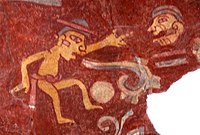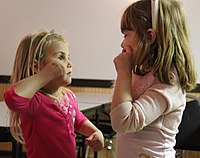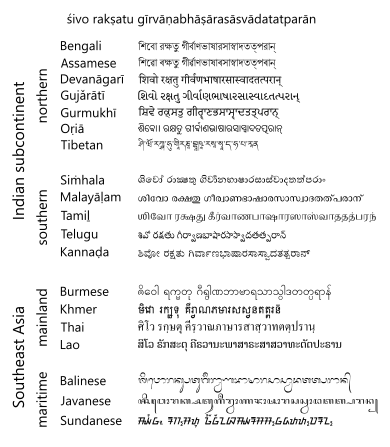Portal:Language
Introduction



Estimates of the number of human languages in the world vary between 5,000 and 7,000. Precise estimates depend on an arbitrary distinction (dichotomy) established between languages and dialects. Natural languages are spoken, signed, or both; however, any language can be encoded into secondary media using auditory, visual, or tactile stimuli – for example, writing, whistling, signing, or braille. In other words, human language is modality-independent, but written or signed language is the way to inscribe or encode the natural human speech or gestures.
Depending on
The scientific study of language is called
Selected language -

Erromintxela (Basque pronunciation: [eromintʃela] ⓘ) is the distinctive language of a group of Romani living in the Basque Country, who also go by the name Erromintxela. It is sometimes called Basque Caló or Errumantxela in English; caló vasco, romaní vasco, or errominchela in Spanish; and euskado-rromani or euskado-romani in French. Although detailed accounts of the language date to the end of the 19th century, linguistic research began only in the 1990s.
The Erromintxela are the descendants of a 15th-century wave of Kalderash Roma, who entered the Basque Country via France. Both ethnically and linguistically, they are distinct from the Caló-speaking Romani people in Spain and the Cascarot Romani people of the Northern Basque Country. Erromintxela is a mixed language (referred to as Para-Romani in Romani linguistics), deriving most of its vocabulary from Kalderash Romani but using Basque grammar, similar to the way the Angloromani language of the Roma in England mixes Romani vocabulary and English grammar. The development of the mixed language was facilitated by the unusually deep integration of the Erromintxela people into Basque society and the resultant bilingualism in Basque. The language is in decline; most of the perhaps 1000 remaining speakers live on the coast of Labourd and in the mountainous regions of Soule, Navarre, Gipuzkoa and Biscay. (Full article...)Did you know (auto-generated)

- ... that the Greco-Australian dialect, a variety of Modern Greek, blends words with English roots into the Greek language?
- ... that Interlingue, an international auxiliary language, was released 100 years ago under the name Occidental by a Baltic German from Estonia?
- ... that Astrid Lindgren can be read in 100 languages?
- ... that María Teresa Sesé wrote 500 romance novels in her native Spanish, then wrote several books in Basque after studying the language for two years?
- ... that the art of Irma Blank, of "drawing languages without words" and including sounds, was recognised in the 1970s but fell into obscurity until a rediscovery in the 2010s?
- ... that the 1962 ?
More did you know -
- ...that young people are more literate in Hakha Chin than their elder counterparts?
- ...that there are at least 10 Malay-based creoles?
- ...that the extinct Kalaallisut?
- ...that Russian is the most widely spoken foreign language in Armenia?
Categories
Linguistics: Computational linguistics • Grammar • Historical linguistics • Morphology • Phonetics • Phonology • Pragmatics • Reading • Semantics • Sociolinguistics • Syntax • Writing
Languages: Language families • Pidgins and creoles • Sign languages
Linguists: By nationality • Historical linguists • Morphologists • Phoneticians • Phonologists • Sociolinguists • Syntacticians • Translators
Stubs: Constructed languages • Languages • Linguists • Pidgins and creoles • Typography • Vocabulary and usage • Writing systems
Full Language category tree
|
|---|
|
Select [►] to view subcategories
|
Related portals
Selected topic -
Selected picture -
Language News
- 25 April 2024 – International reactions to the Israel–Hamas war
- The Arabic language spokesperson of the United States Department of State resigns in opposition to U.S. Gaza policy. (Reuters)
- 1 January 2024 – Public Domain Day
- The animated short film Steamboat Willie, the German-language version of the novel All Quiet on the Western Front, and other works published in 1928 enter the public domain in the United States. (Mashable)
Topics

Languages of Africa:
Languages of the Americas:
Languages of Asia:
Languages of Austronesia:
Languages of Europe:
Constructed languages:

See also: List of linguists

Other writing systems:
See also: History of the alphabet, Script
Associated Wikimedia
The following Wikimedia Foundation sister projects provide more on this subject:
-
Commons
Free media repository -
Wikibooks
Free textbooks and manuals -
Wikidata
Free knowledge base -
Wikinews
Free-content news -
Wikiquote
Collection of quotations -
Wikisource
Free-content library -
Wikiversity
Free learning tools -
Wiktionary
Dictionary and thesaurus
Find a language
| Enter an ISO 639 code to find the corresponding language article |























